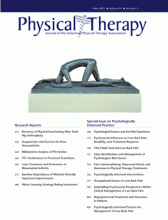Abstract
Background Minimal clinically important improvement (MCII) is the smallest outcome measure change important to patients. Research suggests that MCII is dependent on patients' baseline functional status measures.
Objective The purposes of this study were: (1) to confirm whether MCII is dependent on patients' admission scores and (2) to test whether MCII is dependent on selected demographic characteristics.
Study Design and Setting This was a prospective, longitudinal, observational cohort study of 6,651 patients with orthopedic knee impairments treated in 332 outpatient rehabilitation clinics in 27 states in the United States.
Outcome Measures Patient self-reports of functional status (FS) from the Lower Extremity Functional Scale were assessed using a computerized adaptive testing application (0–100 scale).
Methods An anchored-based longitudinal method, with a 15-point Likert-type scale (−7 to +7), was used to provide a global rating of change (GROC). The MCII threshold for the GROC was defined at a cut-score of +3 or greater and was determined using nonparametric receiver operating characteristic curve analysis for each of the following variables: sex, symptom acuity, age group, and quartile of baseline FS scores.
Results The results showed that MCII was dependent on patient baseline and demographic characteristics. Patients who were male, were younger, had more-acute symptoms, or had lower FS scores at admission required more FS change to report meaningful change.
Limitations As this study was a secondary analysis, how the length of treatment mediated the relationship between the independent and dependent variables was unclear.
Conclusions Although a single MCII index may provide a standard cut-score defining the smallest FS change that is meaningful to patients, researchers and clinicians should be aware that MCII is context specific and not a fixed attribute. Current results may help researchers, clinicians, and policy makers to interpret FS change related to the importance of the change to the patient.
Footnotes
Dr Wang, Dr Hart, and Mr Stratford provided concept/idea/research design. Dr Wang and Dr Hart provided writing. Dr Hart and Mr Mioduski provided data collection. Dr Wang provided data analysis. Mr Mioduski provided project management and participants. Dr Hart and Mr Stratford provided consultation (including review of manuscript before submission).
This project was approved by the Institutional Review Board for the Protection of Human Subjects from the Focus On Therapeutic Outcomes, Inc.
- Received July 13, 2010.
- Accepted January 10, 2011.












